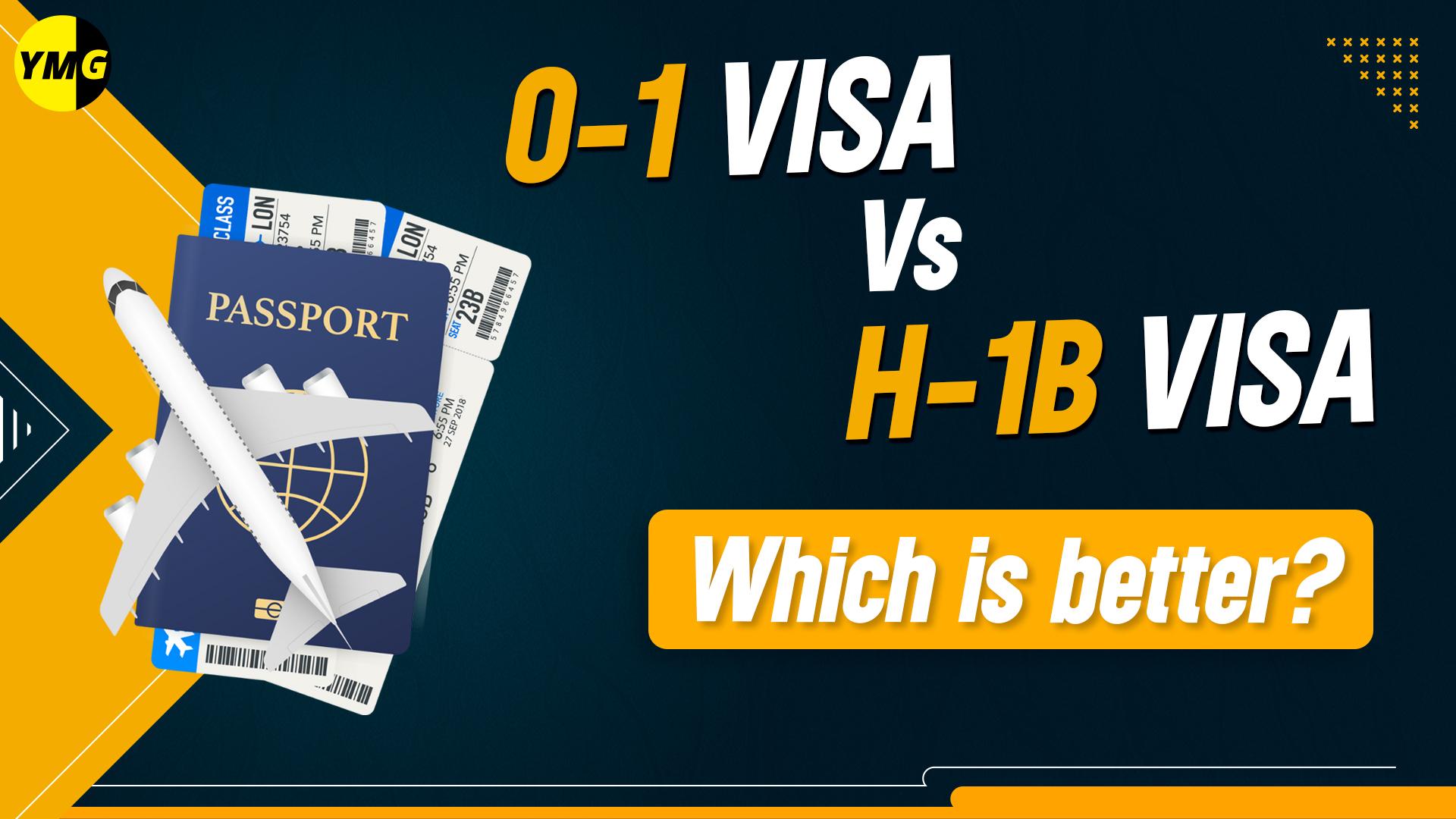Which is better? O-1 Visa vs H-1B Visa


Are you looking for a permit to work in the United States? If that is the case, this blog might be the one that will guide you about the ins and outs of the two work visas: the O-1 and the H-1B. While both the O-1 and H-1B visas offer the opportunity to live and work in the US, the eligibility, benefits, and requirements differ.
Get your inquisitive minds ready as we look into which might be the best fit for you.
What Are the O-1 and H-1B Visas?
Firstly, both the O-1 and H-1B visas are non-immigrant visas (NIV), which means that they will allow you to work in the US only temporarily. Secondly, in order to apply for these visas, you need to have a job offer from a US employer before you can apply for these visas. However, that is where the similarities end.
The O-1 visa is designed for individuals who have achieved extraordinary accomplishments in their field. If you are a well-seasoned professional in science, business, education, athletics, arts, or the TV and entertainment industry, then you are qualified to apply for an O-1 visa.
The H-1B visa is a non-immigrant work visa that allows foreign workers with specialized skills to work in the United States for a set period of time. You must at least be a graduate with a bachelor's degree to qualify for these positions. Most of the H-1B recipients belong to the fields of technology, finance, engineering, and architecture, among others.
Differences Between O-1 and H-1B Visa
1. QUALIFICATION REQUIREMENTS
| O-1 VISA | H-1B VISA |
| Requires proof of extraordinary ability. | No proof of extraordinary ability is required. |
| No formal education requirements (you could even be a high school dropout if your achievements are substantial). | Requires at least a Bachelor's degree related to the field of employment. |
| Meet three or more of the eight criteria for O-1A or two of six for O-1B. | The application process is more lenient, focusing more on educational and job-specific qualifications. |
2. APPLICATION AND RENEWAL
| O-1 VISA | H-1B VISA |
| You can apply anytime and start working once approved. | The number of visas is limited, so the recipients are decided through a lottery system. |
| Your visa can be extended indefinitely as long as you continue to meet the criteria. | Your H-1 B visa will be initially valid for three years. After this, you can renew it for a total of six years. Once the years pass, you must either leave the U.S. for a year or have an approved I-140 and pursue a green card. |
Need assistance with visa applications?
Get complete help filling your applications, securing your slot, and acing the interview.
3. EMPLOYMENT FLEXIBILITY
| O-1 VISA | H-1B VISA |
| Unless you are employed by a specific employer, you are allowed to work with multiple employers if you are sponsored by an agent or your own agency. | Work authorization is valid only for the specific employer. |
| You are not restricted to a specific start date for applications. | There is a fixed start date. Usually, the day is October 1, regardless of the time of your application. |
4. FAMILY CONSIDERATIONS
| O-1 VISA | H-1B VISA |
| Your spouse, along with children aged 21 and below, can accompany the visa holder but are not given the permit to work. | Spouses (H-4 visa holders) can obtain work authorization, making it a more family-friendly option for dual-income households. Your children aged below 21 can accompany you, and you can also bring your parents to the US for a 6-month-long visit. |
5. GREEN CARD PATHWAYS
EB-1A (Extraordinary Ability)
| O-1 VISA | H-1B VISA |
| O-1 visa holders often target EB-1A due to similar eligibility criteria. Both require proof of extraordinary ability in areas like the arts, sciences, business, education, or athletics. O-1 holders can self-petition for an EB-1A without needing employer sponsorship or labor certification (PERM). | H-1B holders rarely qualify for EB-1A unless they can demonstrate extraordinary achievements. H-1B visa holders would typically have to show accomplishments well beyond the typical professional sphere. It is, however, possible to build your profile for an EB-1A visa. |
EB-1B (Outstanding Professors and Researchers)
| O-1 VISA | H-1B VISA |
| Some O-1 holders may qualify for EB-1B, especially if they’ve demonstrated international recognition in academia or research. Employer sponsorship is required, and the employer should be hiring at least three full-time researchers. | H-1B visa holders who are researchers or professors with significant international recognition can qualify for EB-1B if they meet the criteria for outstanding contributions to their field. |
EB-1C (Multinational Executives and Managers)
| O-1 VISA | H-1B VISA |
| The O-1 visa is generally not used for EB-1C, as it’s designed for executives or managers at multinational companies. | EB-1C is a common path for H-1B holders working in multinational corporations as managers or executives. They must have worked abroad in a managerial role for at least one year with the same company. |
EB-2: Professionals with Advanced Degrees or Exceptional Ability
| O-1 VISA | H-1B VISA |
| O-1 visa holders with a master's degree or higher easily qualify for EB-2 under the exceptional ability subcategory. O-1 holders typically prefer EB-1 due to the PERM process required for EB-2. | EB-2 is a common path for H-1B visa holders who hold advanced degrees (master’s, PhD) or demonstrate exceptional ability. For most H-1B workers, this route requires employer sponsorship and the PERM process. In certain cases, the National Interest Waiver (NIW) allows H-1B holders to self-petition without needing employer sponsorship. |
EB-3: Skilled Workers, Professionals, and Other Workers
| O-1 VISA | H-1B VISA |
| O-1 visa holders do not generally apply for EB-3, as their extraordinary abilities typically qualify them for EB-1 or EB-2. Applying for EB-3 would usually be unnecessary unless their extraordinary accomplishments are insufficient for higher EB categories. | Many H-1B holders qualify for EB-3 as professionals if they possess a bachelor’s degree and are employed in a specialty occupation. This category requires employer sponsorship and labor certification, but the wait times for EB-3 are generally longer compared to EB-2 due to higher demand. |
EB-4: Special Immigrants
| O-1 VISA | H-1B VISA |
| O-1 visa holders typically do not transition to EB-4 unless they fall into one of the special immigrant categories, which is uncommon for individuals with extraordinary abilities. | Similarly, H-1B holders typically do not pursue EB-4 unless they qualify as religious workers or translators, for instance. EB-4 is specialized and does not require labor certification. |
EB-5: Immigrant Investors
| O-1 VISA | H-1B VISA |
| O-1 visa holders do not generally transition to EB-5, as their path to a green card is usually through extraordinary ability categories like EB-1A. | Some H-1B holders may pursue EB-5 if they have the financial means to invest and create jobs in the U.S. This is an alternative pathway if other employment-based options take too long. |
Pros and Cons of O-1 Visa and H-1B Visas
O-1 VISA
| PROS OF O-1 VISA | CONS OF O-1 VISA |
| No degree requirement. | Spouses cannot work. |
| No annual cap or lottery. | Extensive documentation is required. |
| Flexible criteria for qualification. | Complications when applying for a green card. |
| Unlimited visa extensions. | No simple "transfer" of your visa from one employer to another. Each employer must independently apply for an O-1 visa for you, and the approval of the old visa does not carry over to a new employer. |
| Ability to work for multiple employers with an agent sponsor. |
H-1B VISA
| PROS | CONS |
| Spouses can work. | Subject to annual cap and lottery. |
| Easier employer transition. | Requires employers to pay a minimum prevailing wage. |
| Straightforward qualification with a bachelor's degree. | Strict start dates and limited renewal period. |
Making the Right Choice
Choosing between the O-1 and H-1B visas depends on your professional qualifications, personal circumstances, and long-term goals. If you have extraordinary achievements and seek a flexible visa with unlimited renewals, the O-1 might be ideal. However, if you prefer a more straightforward application process with spousal work authorization, the H-1B could be the better choice.
If you're still unsure which visa suits your needs, consider consulting our counseling experts, who can provide personalized guidance based on your unique situation. Finding your way around the US immigration system can be complex. Still, with the right information and support, you can make a decision that fits your professional and personal goals.
Frequently Asked Questions!

The initial O-1 status is granted for up to three years at a time. After this, you can indefinitely renew annually.

The con of an O-1 visa is that spouses are not allowed to work.

Yes, you can go from H-1B visa to O-1 visa.

Yes. As an H-1B visa is classified as a dual-intent visa for both residence and work, you can apply for both a Green Card and an H-1B visa at the same time.

Every year, somewhere between 80-95% of nonimmigrant O1 visas are approved. This approval rate is quite high among other non-immigrant visas, though the exact number of O1 visas approved each year can vary.

A green card gives an individual permanent resident status and can be renewed every ten years, whereas an H1-B visa is temporary and explicitly tied to an employer.

Any US-based employer can sponsor the H-1B visa.

When your employment ends, your H1B status ends. There is no “grace period” for H1B status.

O-2 visas are available to individuals who seek to accompany or assist an athletic or artistic event and the O-1 performer. O-3 visas are issued to the spouses and unmarried children of O-1 and O-2 visa holders.

Spouses and children under the age of 21 of H-1B employees are considered dependents.

No, you cannot apply for an O-1 visa without an employer or an agent sponsoring you. However, you can set up your own company and sponsor yourself.

There is no simple "transfer" of your visa from one employer to another. Each employer must independently apply for an O-1 visa for you, and the approval of the old visa does not carry over to a new employer.




